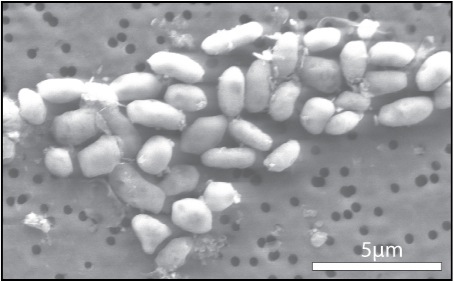Special delivery! See our visiting baby yaks (Dec. 20–Jan. 5) this holiday. Learn more
Science News
Arsenic and Old GFAJ-1
December 2, 2010

In a NASA press conference today, Felisa Wolfe-Simon of NASA’s Astrobiology Institute and the U.S. Geological Survey in Menlo Park said she’s always looking for exceptions to the rule.
And she’s found one, in an almost alien life form right here on Earth.
People have been speculating and tweeting all week since NASA released news that they would hold a press conference today on the latest discovery in astrobiology, “the study of the origin, evolution, distribution and future of life in the universe.”
This morning it became so out of control, the embargo on the story was lifted a few hours early.
It’s not life on Mars or Saturn’s moon Titan. In fact, this freaky form of alien life comes from right here in California. No big surprise for some.
Wolfe-Smith and her team discovered bacteria living in Mono Lake that can exist unlike any other life form on our planet. In addition to the press conference, their results are published online today in Science Express.
The bacteria were already living in a somewhat toxic environment. Salty and alkaline Mono Lake is home to no fish, only algae, shrimp and bacteria—and more than a little arsenic. The scientists brought the bacteria to a lab and gradually gave the microbes more and more arsenic. One microbe in particular, GFAJ-1, grew and doubled as normal bacteria should.
Not only did the GFAJ-1 feed off the arsenic, they incorporated it into their biochemistry and DNA, replacing phosphorus. Holy #&*@! Nature puts it a little more delicately, reporting that this finding suggests
the possibility of a biochemistry very different from the one we know, which could be used by organisms in past or present extreme environments on Earth, or even on other planets.
Phosphorus is considered one of the six essential elements for life anywhere in the Universe, along with oxygen, hydrogen, carbon, nitrogen and sulfur. Phosphorus holds the double helix of DNA together, making it seem fairly essential. But arsenic seems to be able carry the load in GFAJ-1. James Elser, of Arizona State University, was almost incredulous during the press conference:
I’ve studied phosphorus my whole career and have always taught that every living thing uses phosphorus to build its DNA.
Oops! But it could still be true—the arsenic-laced GFAJ-1 still hold trace amounts of phosphorus.
“We’ve cracked the door open on how life is formed elsewhere in the Universe!” concluded Wolfe-Simon. But one of her co-authors, Paul Davies of Arizona State University, chooses more cautious prose in a press release:
This organism has dual capability. It can grow with either phosphorus or arsenic. That makes it very peculiar, though it falls short of being some form of truly ‘alien’ life belonging to a different tree of life with a separate origin. However, GFAJ-1 may be a pointer to even weirder organisms. The holy grail would be a microbe that contained no phosphorus at all.
More rule exceptions to come!